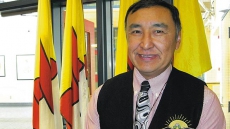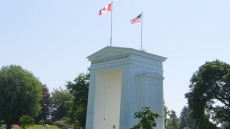LEVIS, Que. — As Luc Villeneuve begins talking to a reporter about his renewable energy foundation, he is abruptly interrupted outside the conference room where public hearings on Energy East are taking place.
"You didn't come here in an electric car, did you?" truck driver Michel Morin asks in a taunting voice.
Villeneuve, 46, a little shaken, replies he would love to buy such a car.
"But there is oil in the car you drove here, isn't there?" Morin aggressively counters, before storming off into the room where TransCanada vice-president Louis Bergeron is trying to assuage local concerns about the proposed pipeline.
Villeneuve smiles and says, "He's been after me for days. I don't know that guy's name but he hates all environmentalists."
On Friday, Quebec's environmental review agency wrapped up two weeks of hearings into the Energy East proposal by TransCanada (TSX: TRP). More hearings are scheduled to begin April 25.
Every day, Quebecers lined up at the back of the room inside a modern hockey complex across the St. Lawrence River from Quebec City in order to register to grill Bergeron and officials from the National Energy Board and Environment and Climate Change Canada.
The hearings were civil but tense as the majority of participants voiced either outright opposition to the pipeline or high levels of skepticism about TransCanada's promises to safely transport 1.1 million of barrels of oil daily through Quebec territory.
Many of the participants were retired, middle-class parents who started their own environmental organizations out of their basements.
Irene Dupuis, 65, a retired elementary school teacher, co-founded her environmental group with her sister, Carole.
"Under what circumstances is TransCanada not responsible for spills?" she asked the commission. "What if its IT system is hacked, what about vandalism, earthquakes?"
Bergeron said a new federal law coming into effect this summer stipulates companies like his will be entirely responsible for up to $1 billion in cleanup costs associated with a spill, regardless of who is at fault.
"What about if a spill costs $1.1 billion?" Dupuis pressed, ignoring the one-question rule.

TransCanada will still have to pay upfront but can try and recoup the money from those responsible, Bergeron said.
Outside the conference room, Dupuis said TransCanada's promises mean little to her.
"Every day when I drive my grandson to daycare, he asks me about the colour of the St. Lawrence River," she said. 'Why is it blue today?' he asks me. 'Why is it greyish today?' I don't want him to ask me one day why it's black."
Denis Desmeules, 59, a retired health-care worker, volunteers for a Quebec City-area environmental group that opposes pipelines.
"The science shows us global warming is real," he said. "So when will we stop?
"The people who work in the industry, they want a salary, they want to pay for their car, they want to work. Environmentalists threaten their livelihoods."
One of those threatened is Morin, who after calming down from his encounter with Villeneuve, lights a cigarette outside the hockey complex and discusses his frustrations.
"I have no problem with environmentalists," says the truck driver. "But they should arrive here on foot or in electric cars if they are going to criticize oil and pipelines.
"I am for the pipeline. It moves the economy. It gives us work."
He says Quebecers want expensive services but refuse major projects that can pay for them.
"We can't have it all," he argues. "Daycares at $7 a day paid for with money from other provinces. We want parental leave for men. Then we reject energy projects."
TransCanada wants to build a 4,600-kilometre pipeline from Alberta and Saskatchewan's oil deposits to a marine terminal in New Brunswick.
In between, the pipeline is supposed to cross hundreds of kilometres of Quebec territory, connecting to refineries in Montreal and Quebec City.
Final approval rests with Prime Minister Justin Trudeau's cabinet after a review by the federal National Energy Board.
Quebec's environmental review board is scheduled to produce a report in November. While its recommendations are not legally binding, Trudeau will have a difficult time green-lighting the project if it's rejected in Quebec.
Real Picard, 72, a former worker at Quebec's City's Valero oil refinery, said he's for the pipeline — "with conditions."
He said he's worried about corrosion but that what concerns him most is the threat of another event like the one nearly three years ago that overshadows much of the discussion on energy projects in Quebec.

A recent report says many residents of Lac-Megantic were still suffering nearly 30 months after an oil-train derailment killed 47 people in July 2013.
"Lac-Megantic wouldn't have happened if that oil was being transported by pipeline," Picard said. "The pipelines will take some of the trains away."




